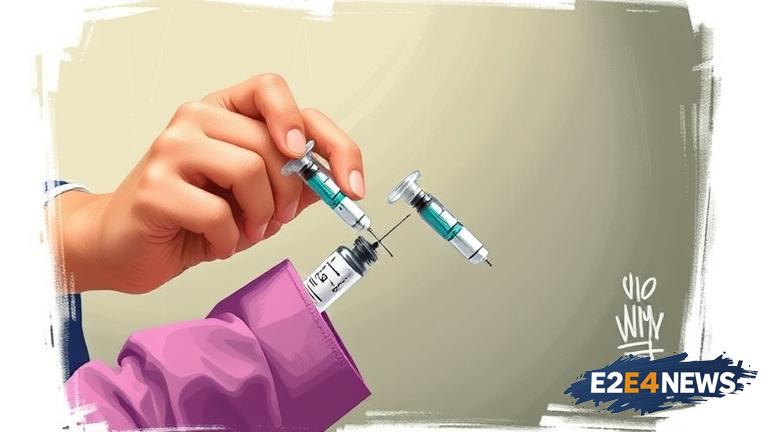The United States is currently facing a decline in vaccination rates, with many states reporting a significant drop in immunization coverage. Amidst this trend, a new bill proposed by Republican lawmakers is seeking to expand exemptions for vaccinations, sparking a heated debate about the potential consequences for public health. The bill, which has been met with opposition from medical professionals and health experts, would allow parents to opt-out of vaccinating their children for non-medical reasons. Proponents of the bill argue that it is a matter of personal freedom and parental choice, while opponents claim that it would put vulnerable populations at risk of contracting preventable diseases. The Centers for Disease Control and Prevention (CDC) has reported a steady decline in vaccination rates over the past few years, with some states experiencing a decline of up to 10%. This trend is particularly concerning for diseases such as measles, mumps, and whooping cough, which can have serious consequences for individuals with compromised immune systems. The World Health Organization (WHO) has also expressed concern about the decline in vaccination rates, citing the importance of herd immunity in preventing the spread of infectious diseases. Herd immunity refers to the concept that a certain percentage of a population must be immunized in order to prevent the spread of a disease. If vaccination rates fall below this threshold, it can leave vulnerable populations, such as the elderly and young children, at risk of contracting the disease. The proposed bill has been met with criticism from the medical community, with many experts arguing that it would undermine the progress made in preventing the spread of infectious diseases. The American Academy of Pediatrics (AAP) has released a statement opposing the bill, citing the importance of vaccinations in preventing the spread of diseases. The AAP has also emphasized the safety and effectiveness of vaccines, which have been extensively tested and proven to be safe for use in children and adults. Despite the opposition, the bill has gained support from some parents who claim that vaccines are not safe or effective. However, these claims have been thoroughly debunked by scientific evidence, which has consistently shown that vaccines are safe and effective in preventing the spread of diseases. The debate surrounding the bill has also raised questions about the role of government in regulating public health. While some argue that the government should not interfere with personal choices, others claim that it is the government’s responsibility to protect the public’s health. The issue has also sparked a discussion about the importance of education and awareness in promoting vaccination rates. Many experts argue that educating parents about the importance of vaccinations and addressing concerns about vaccine safety and effectiveness is crucial in promoting immunization rates. The CDC has launched several initiatives aimed at promoting vaccination rates, including public awareness campaigns and educational programs for healthcare providers. The WHO has also launched a global initiative to promote vaccination rates, which includes providing technical assistance and support to countries to strengthen their immunization programs. In conclusion, the proposed bill to expand vaccination exemptions has sparked a heated debate about the potential consequences for public health. While proponents of the bill argue that it is a matter of personal freedom and parental choice, opponents claim that it would put vulnerable populations at risk of contracting preventable diseases. As the debate continues, it is essential to consider the scientific evidence and the potential consequences of the bill on public health. The decline in vaccination rates is a concerning trend that requires immediate attention and action. By promoting education and awareness, addressing concerns about vaccine safety and effectiveness, and supporting initiatives to strengthen immunization programs, we can work towards preventing the spread of infectious diseases and protecting the public’s health.





